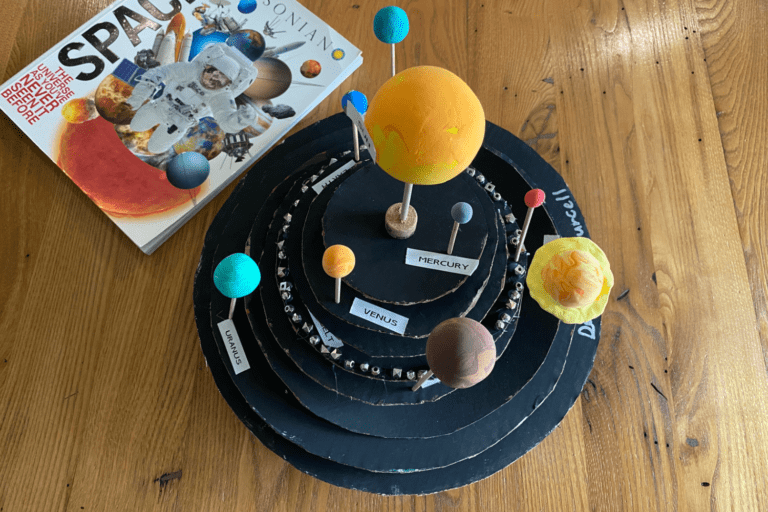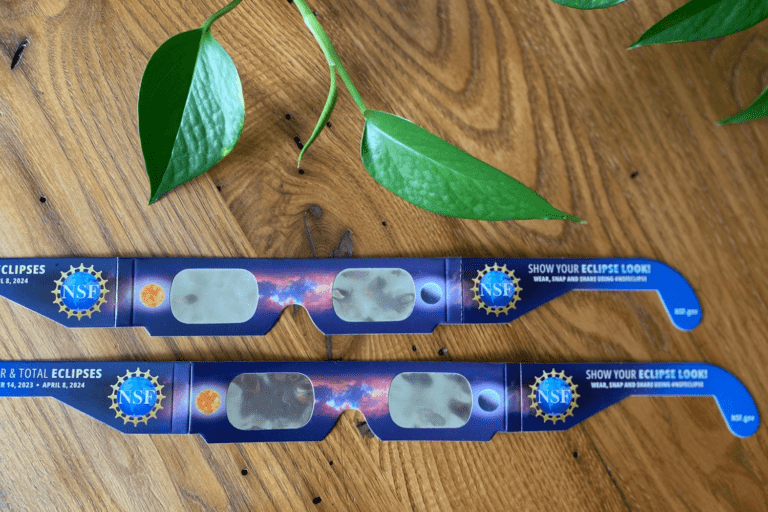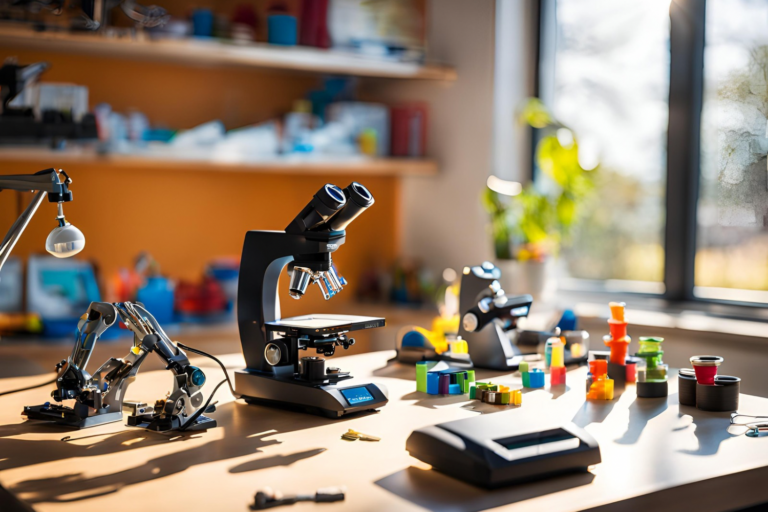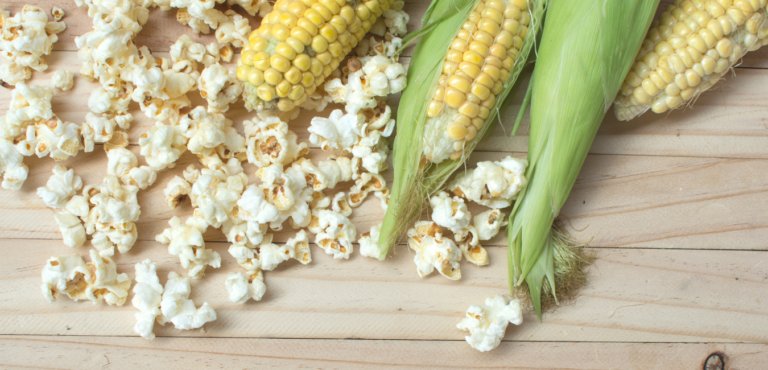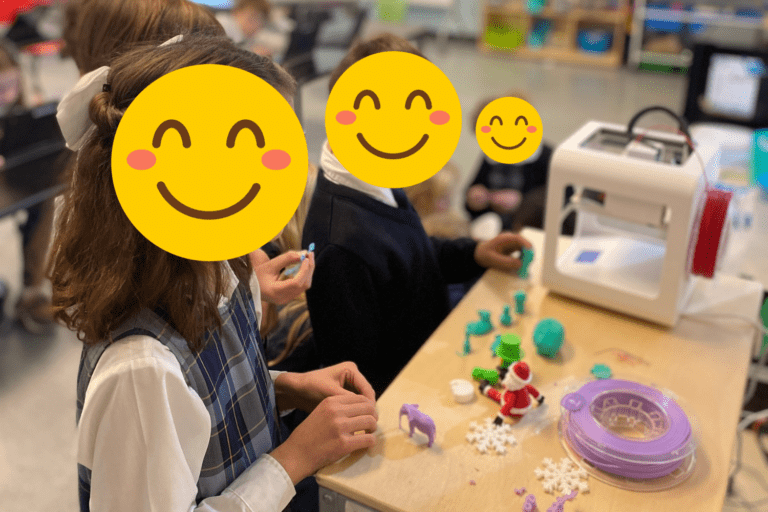How to Teach Sustainability & STEM Concepts at a Refill Store
Are you looking for practical examples of how STEM skills can be applied to our daily lives? Bring your kids on your next sustainable shopping trip to your local refill store to explore STEM concepts in Chemistry, Physics, Math, and Materials Science!

Finding practical examples of how sustainability and STEM (Science, Technology, Engineering, and Math) are interconnected can be simple if you know where to look. I recently visited my local refill store, Refillism, to chat with owner Elizabeth Bower about her reasons for opening a refill and zero-waste lifestyle store, as well as how she uses STEM to drive her daily decision making process as a small business striving to make environmentally conscious choices.
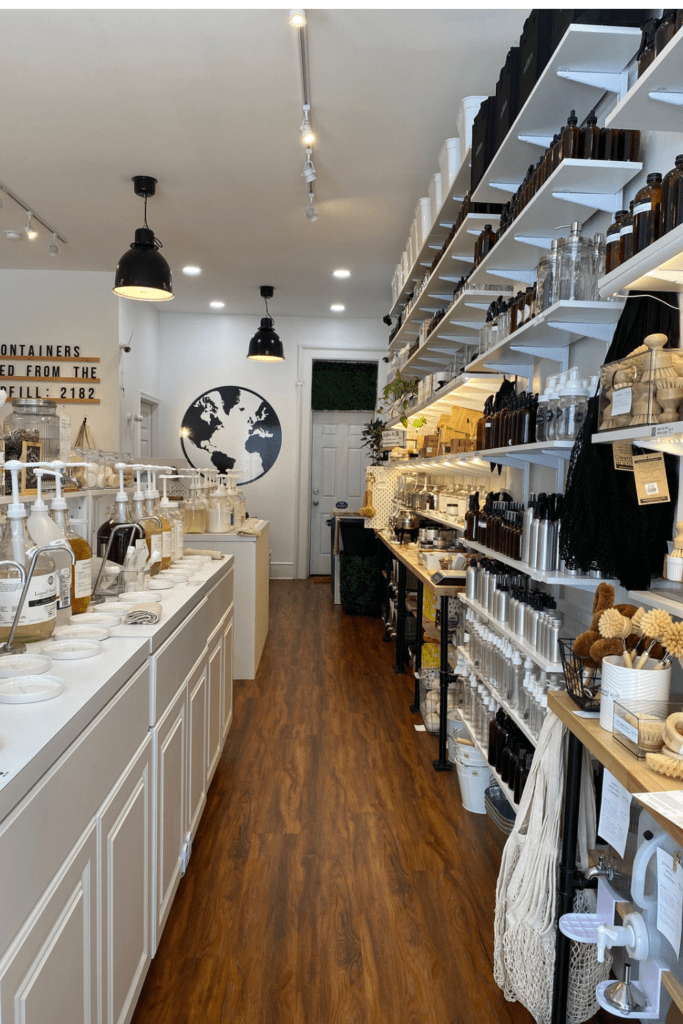
What is a Refill Store?
A refill store is a retail establishment that specializes in offering products in bulk and allowing customers to bring their containers to refill with the products they need, rather than purchasing new packaging each time. This helps reduce waste, conserve resources, and lower costs for customers. Refill stores typically offer a variety of household and personal care products such as cleaning supplies, toiletries, snacks, and more. The products are dispensed by weight, and customers pay only for the amount they take, rather than the packaging. By offering a more sustainable alternative to traditional retail, refill stores help promote a more environmentally friendly and cost-effective way of life.
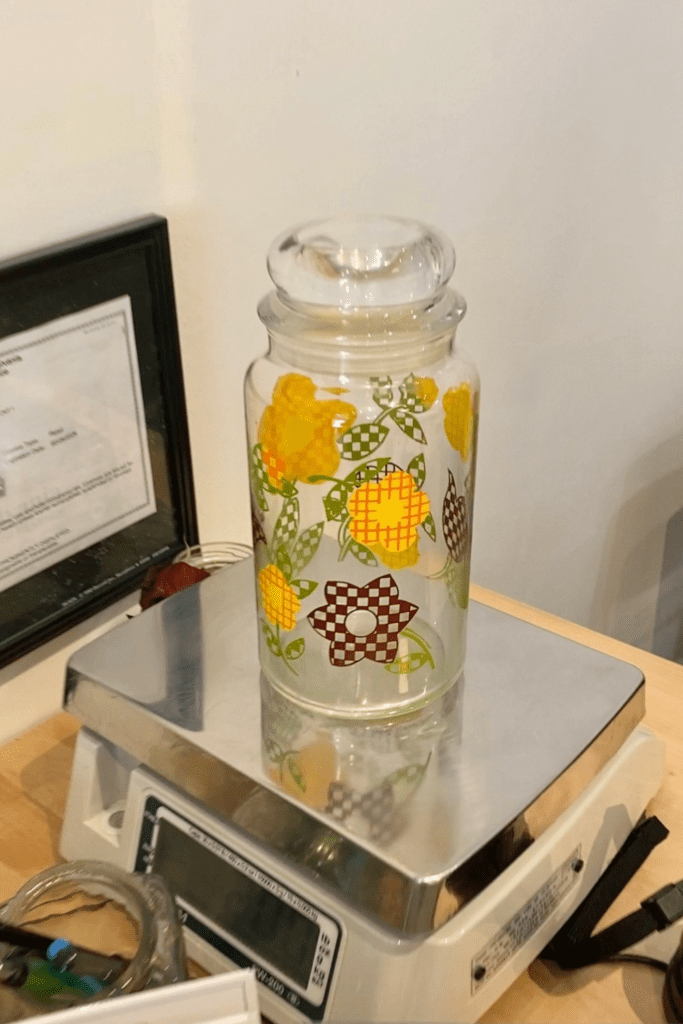
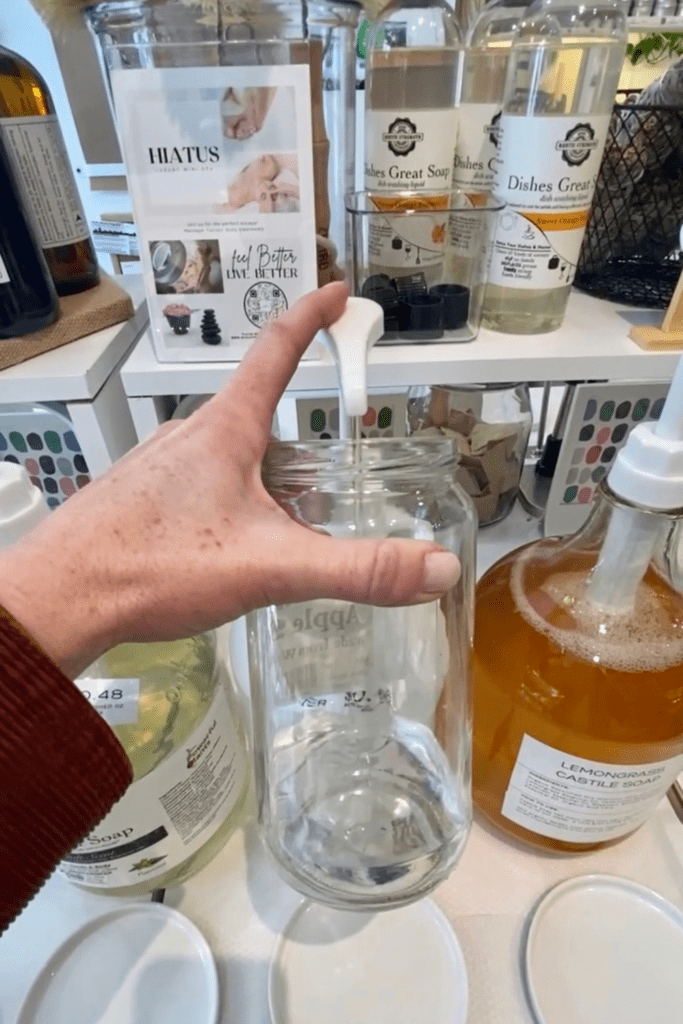
How Does A Refill Shop Work?
In a refill shop, products are usually measured by weight, typically using a digital scale. The customer brings in their empty container and the weight is recorded. Then the container is filled with the desired product and weighed again. The difference between the two weights is the amount of product that has been dispensed, and the customer is charged accordingly. The scale typically has a display that shows the weight in grams or ounces, and can accurately measure small increments to ensure that the customer is charged for the exact amount of product they receive.
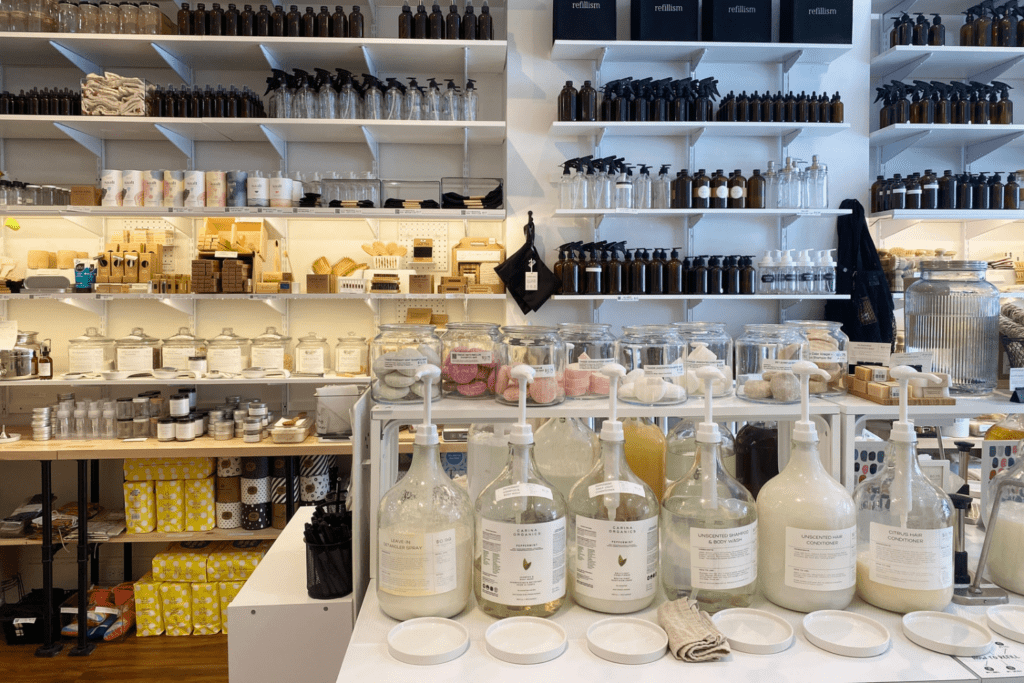
What STEM Concepts Can Be Learned at a Refill Store?
Did you know that while you shop sustainably at a refill store, you can simultaneously introduce your kids to various topics in science, technology, engineering, and math? A refill store is a fantastic place to learn about various real-world STEM applications. Here are some examples:
Chemistry Concepts
Refill stores often offer a variety of cleaning and personal care products that can be refilled. This provides an opportunity to learn about the chemical composition of these products and how they work. Products like baking soda (sodium bicarbonate, NaHCO3) and white vinegar are commonly found on the shelves of refill stores, as they are highly versatile substances that can be used for cooking, baking, and cleaning purposes! If you’d like to learn more about the simple chemistry of cleaning with vinegar, check out this post.
The viscosity of a product is another chemistry concept that must be considered by the store owner when purchasing dispensers for liquid products. Viscosity is a measure of a fluid’s resistance to flow. In other words, it is the thickness or stickiness of a fluid, which determines how easily it can be poured or moved.
For example, the viscosity of a liquid shampoo or conditioner will be much higher than white vinegar or a multi-purpose cleaning liquid, which means that the pumps used to dispense those liquids will need to be designed differently. A refill shop owner will not want their dispensing pumps to clog every time a customer uses them, so choosing the proper pump based on the product’s viscosity is an important factor to consider when setting up the store.
Environmental Science Concepts
Refilling products can reduce waste and help protect the environment. By using refill stores, individuals can learn about the importance of reducing plastic waste and the environmental impact of various products.
Math Concepts
Refill stores often sell products by mass, which can be a great opportunity to practice measuring and weighing items. The mass of an item is typically measured in grams, allowing students to accurately measure the amount of a product using a digital scale. This also offers the opportunity to convert between different metric measurements, such as grams to kilograms or grams to milligrams, which, as a former Chemistry teacher, was a necessary standard to be mastered in my classroom!
Refill stores often offer products at a lower price per unit of measurement compared to buying the same products in traditional packaging. Comparing prices of products purchased at a refill store versus a traditional retail store can make for a real-world learning experience for students.
Physics and Material Science Concepts
Physics and materials science are closely related and basic principles of each discipline can be readily observed at refill stores. Refill stores use gravity to dispense products, which can be a great way to learn about the laws of physics and how they apply to real-world scenarios.
Refill stores often offer a variety of packaging options, such as glass, metal, and plastic. This provides an opportunity to learn about the properties of different materials and how they are used in product packaging. For example, you may choose to refill your cleaning products in glass or metal, but choose plastic for your bathroom essentials, as you wouldn’t want the slippery nature of soap and shampoo to cause you to drop your glass container on the bathroom floor!
Understanding how products can be affected by their environment is another area where physics and materials science meet at a refill shop. Materials science relies on thermodynamics, which is the study of energy and its transformation. This is important in understanding how materials respond to changes in temperature, pressure, exposure to light, and other factors. For example, you’ll often find light and dark bottles sold at refill stores, as some products will store better in the absence of natural light, as they degrade faster in the presence of sunlight.
Overall, refill stores provide a unique opportunity to learn about a variety of STEM concepts, including chemistry, environmental science, math, physics, and materials science.
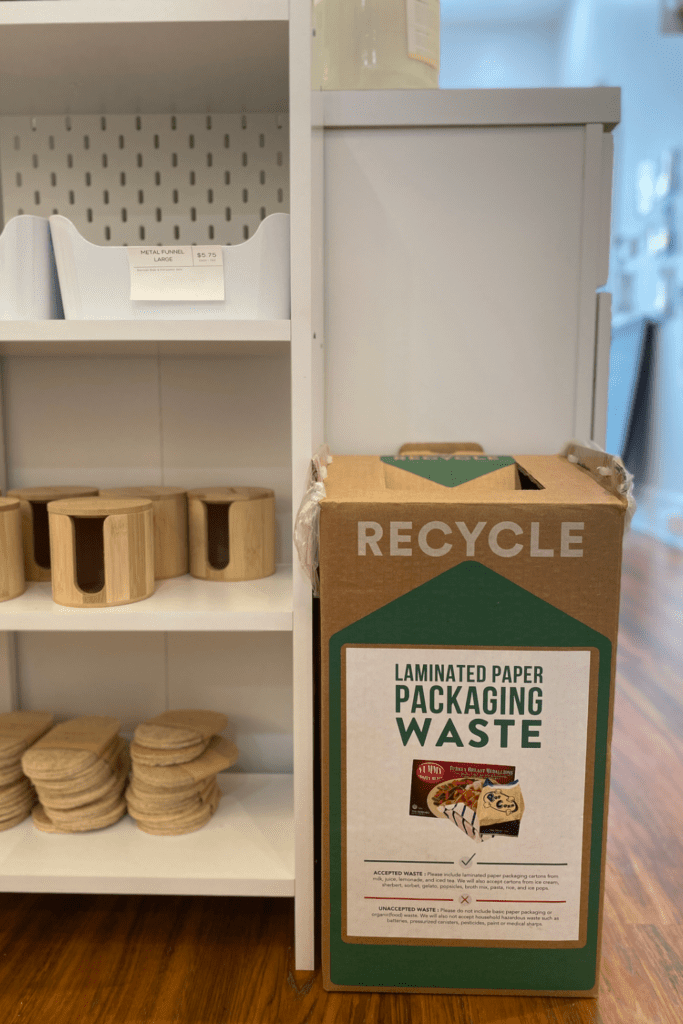
Diving Deeper into the Environmental Benefits of Shopping at a Refill Store
Shopping at a refill store has several environmental benefits, including:
- Reducing waste: Refill stores allow customers to reuse their containers, reducing the amount of packaging waste that ends up in landfills or the ocean. In addition, a customer can choose how much of the product they want to purchase. How often have you wanted to “try-before-you-buy” a new shampoo or conditioner? At a refill store – you can do just that! You only pay for the amount you dispense, allowing you to avoid wasting the product if you do not like it.
- Conserving resources: The production of new packaging requires resources such as energy and raw materials. By reusing containers, refill stores conserve these resources.
- Decreasing emissions: The production and transportation of new products contributes to greenhouse gas emissions. Shopping at a refill store can help reduce these emissions as they purchase items in bulk.
- Supporting local businesses: Refill stores are often locally owned and operated, which can help strengthen the local economy and reduce the carbon footprint associated with transportation.
- Promoting sustainability: By reducing waste and conserving resources, refill stores promote a more sustainable way of life and can help raise awareness about the importance of reducing waste and protecting the environment. Oftentimes, they also promote community engagement, hosting workshops and community events to educate local residents about the importance the roles of reducing waste, conserving resources and decreasing emissions has on their local environment.

The Economic Benefits of Shopping at a Refill Store
Shopping at a refill store has several economic benefits, including:
- Cost savings: Refill stores often offer products at a lower price per unit of measurement compared to buying the same products in traditional packaging.
- Supporting local businesses: By shopping at a locally owned refill store, customers can support their local economy and help create jobs in their community.
- Encouraging entrepreneurship: Refill stores can provide an opportunity for entrepreneurs to start a business and contribute to their local economy.
- Increasing competition: By offering an alternative to traditional retail, refill stores can encourage competition and help drive down prices for consumers.
- Reducing dependence on foreign oil: By reducing the need for new packaging, refill stores can reduce the demand for petroleum-based plastics, which are derived from oil. This can help reduce dependence on foreign oil and improve energy security.
- Creating new business opportunities: Refill stores can spur innovation and create new business opportunities in areas such as product development, packaging design, and distribution.
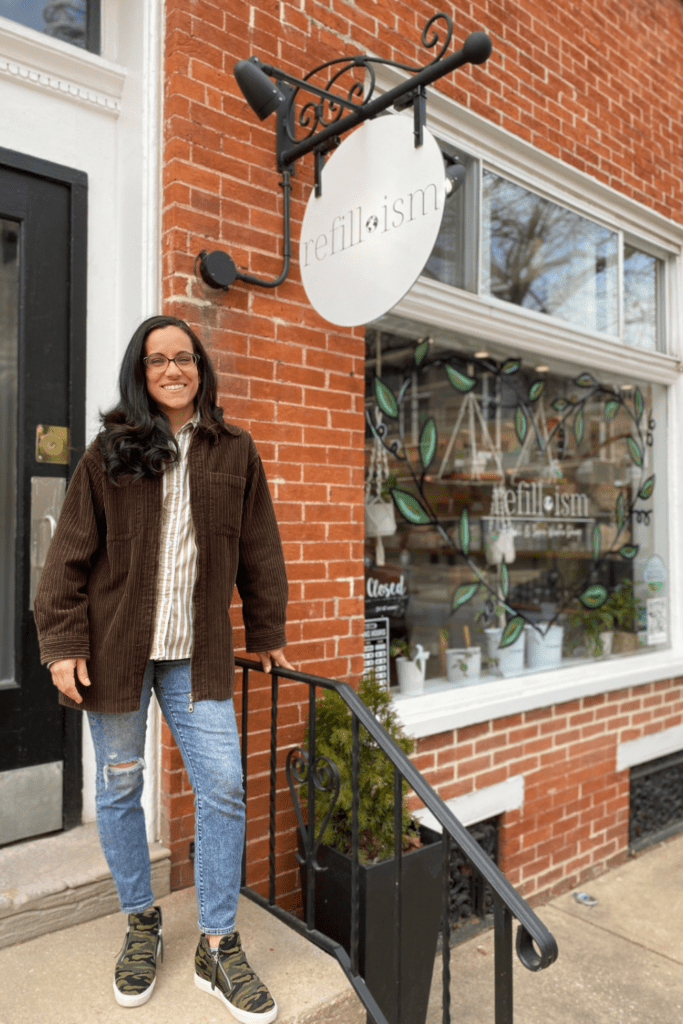
Refillism: A Refill and Zero-Waste Lifestyle Store
I live in central Pennsylvania and recently sat down with Refillism owner, Elizabeth Bower to chat about how her knowledge of STEM concepts was integral to the design and day-to-day running of her zero-waste lifestyle shop.
As a wife and mother of two, Elizabeth’s decision to open a refill shop was born out of a desire to choose non-toxic, environmentally friendly products for her family. She saw a need for access to these products in her York, Pennsylvania community and, after a lot of research and product testing, began accumulating a small stash of low-waste products to sell at community events and pop-up shops. The feedback from her community was so positive that, after a short time she chose a permanent, brick and mortar location for her products in downtown York. Refillism was born!
Elizabeth and I talked at length about how she chooses and dispenses products at her store, and the importance that STEM plays in these daily decisions. Here are just a few examples of how knowledge of science and technology is critical to running her small business.
Considers Product Viscosity
I mentioned earlier that viscosity is a measure of a fluid’s resistance to flow, or how thick and sticky a fluid is. In order for liquid products to dispense properly from large containers, a simple mechanical pump is needed, like the ones you find on the top of your liquid soap dispenser or lotion bottle. Different liquids have different viscosities, and finding the proper mechanical pump is key to dispensing the product and preventing the pump from clogging.
Considers Product Ingredients
Reading ingredient labels is a language all of its own, especially when you dive into self care and cleaning products. Elizabeth knows that her customers come to Refillism looking for quality, well-made products that are healthy for both people and the planet, and spends painstakingly long hours researching the ingredients of products she offers in her shop.
Considers the Carbon Footprint of Products
The carbon footprint of a product refers to the total amount of greenhouse gases, particularly carbon dioxide (CO2), emitted throughout the entire lifecycle of the product – from the extraction of raw materials, manufacturing, transportation, usage, and disposal. Refillism prioritizes local vendors to decrease the carbon footprint associated with transportation. The shop also considers the materials that the products are shipped in and requests that products not be packaged with styrofoam packing peanuts, which are made of petroleum and ultimately increase the carbon footprint of the product.
Considers the Proper Disposal of Product Packaging
Refillism is a zero-waste lifestyle store, and Elizabeth practices what she preaches. When you enter Refillism you are entering a store that proudly displays how it deals with the various materials that accompany the products necessary for her business. Cardboard and brown paper are organized in neatly stacked bins in the back corner of the shop to be recycled or stored under the counter to be reused for online orders. Plain brown paper gift bags, absent of the Refillism logo, are used to package customers in-store purchases, knowing that customers will more likely reuse the bag to wrap a present if the store logo is not printed on it.
Styrofoam packing peanuts and plastic packaging are collected in another bin and taken to a local business called CRDC Global, which takes unwanted plastics and turns them into a component for concrete. Refillism even collects the backs of the sticker labels used by customers to label products and sends them to Terracycle to be turned into new products.
To say that Elizabeth has done her due diligence to ensure her store lives up to its name as a zero-waste lifestyle store is an understatement. By understanding basic STEM principles in the areas of Chemistry, Physics, Materials Science and Engineering she has created a way for her customers, both in her local community and online, to easily understand and access products that are good for both people and the planet.
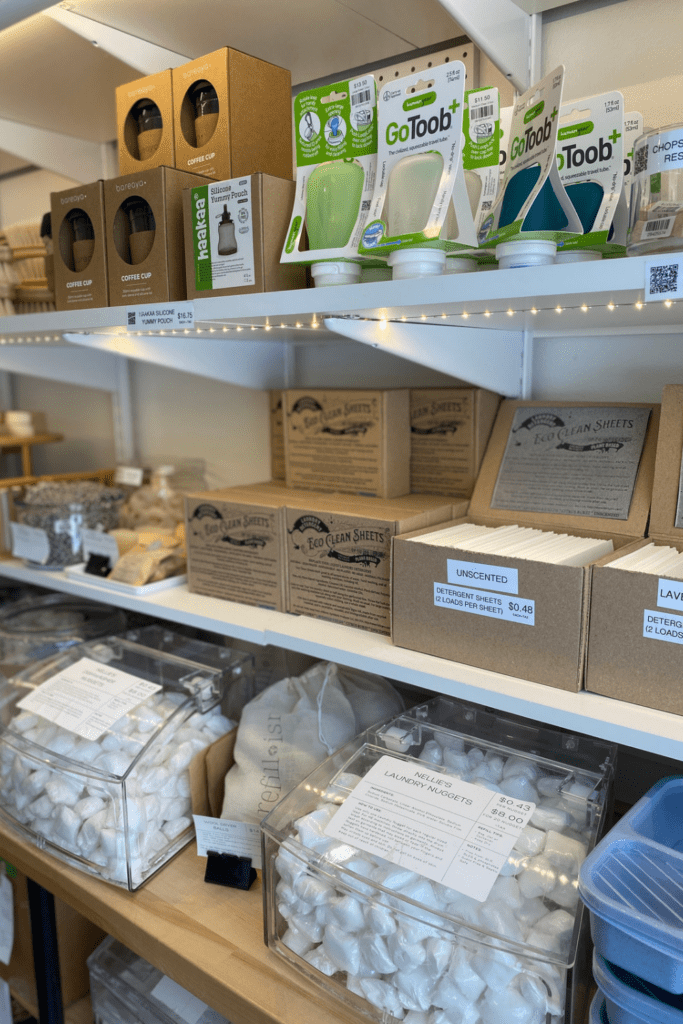
Take A Sustainability Science Field Trip to a Refill Store
There are a multitude of ways that science and sustainability interconnect, and one clear example is the set-up and execution of a refill store. The next time you visit your local refill store, consider bringing your kids along and introducing them to a few of the practical applications of STEM that are present in the shop. If you happen to visit the store when it isn’t busy, see if you can chat with the manager or owner about how they choose the products in their store, what role packaging plays in their decision making process, and how they educate their customers about the environmental impact of their purchases. Keep in mind that the manager or owner may not have time to chat, as they are in the business of running a business! Call ahead if you’d like to schedule some time to have your children ask questions about the shop – more than likely they’ll happily oblige!

How Can I Find Refill Stores in My Area?
There are several ways to find refill stores in your area, including:
- Searching online: You can use search engines like Google and check directories such as Yelp or TripAdvisor to find refill stores near you. You can also search for specific keywords like “refill store” or “zero waste store” along with your city or zip code.
- Social media: Follow environmental groups or zero waste communities on social media platforms such as Facebook or Instagram to find out about local refill stores in your area.
- Local events: Attending local events like farmers’ markets or sustainability fairs can be a great way to find out about refill stores in your community.
- Community groups: Join local environmental or zero waste groups and participate in discussions to find out about refill stores in your area.
- Ask friends and family: Word of mouth can be a powerful tool. Ask friends, family members, or coworkers if they know of any refill stores in your area.
Remember to call ahead or check the store’s website to confirm their hours and offerings before visiting.
All photos were taken by permission on site at Refillism, located in downtown York, Pennsylvania.

